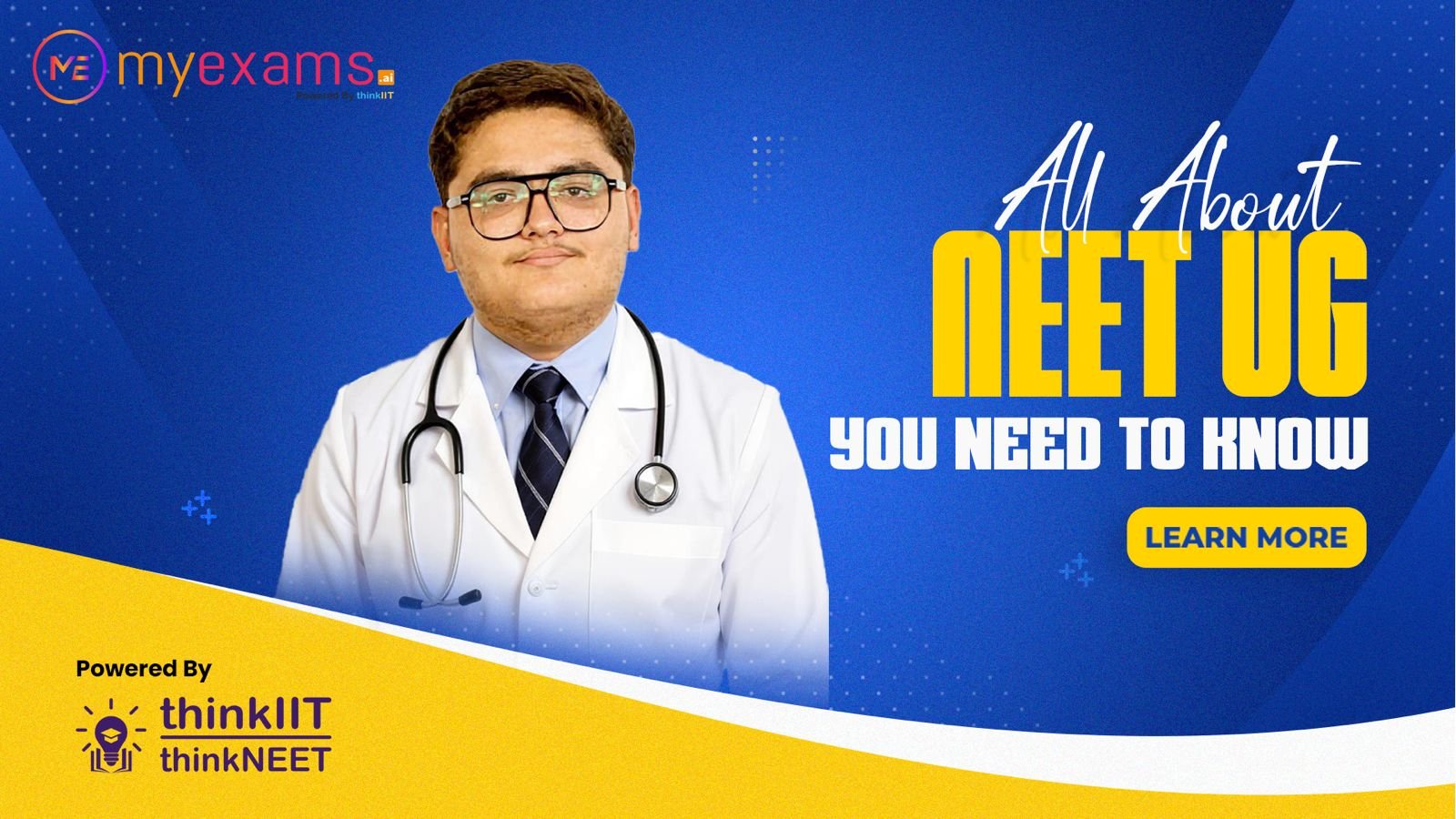All About NEET UG You Need to Know

A friendly, practical guide for students and parents alike!
INTRODUCTION
Remember when someone asked you as a child – What do you want to be when you grow up? Well, with a gleam in our eyes many of us would answer – Doctor! Nostalgic?
It indeed is, for most of us. Now, whether you are a kid or if you are a student with dreams of wearing the (mighty!) white coat someday or a parent with dreams in your eyes about a great career for your child, you must have heard of NEET UG. But let’s admit it — the journey to cracking NEET UG can feel confusing, overwhelming, and even intimidating at times.
There’s a ton of stuff out there — who can take the test? what’s in it? what to study? where to get help? And how to apply? — it’s enough to make your head spin. That’s why we’ve put together this straightforward, plain-English guide that tells you everything you need to know about NEET UG.
If you’re just getting started or you’re already knee-deep in your studies, this article will give you a better idea of what it is — and how to get ready for it.
What is NEET UG?
So, what exactly is NEET UG? Well, NEET UG is an annual pen-and-paper (offline) examination. In other words, it is a single-stage entrance test for admission into medical and allied health courses across India, including those offered by central and state government medical colleges, private institutions and deemed universities. There are some foreign institutions too which accept NEET UG score for admission to their courses.
Why was NEET UG created?
Before NEET UG, there were multiple entrance exams — some by states, some by top institutes like AIIMS and JIPMER. This created confusion, stress, and (allegedly!) some unfair advantages. To streamline the system, NEET UG was introduced in 2016 to make the medical admission process uniform, fair and transparent; across India. This change aimed to simplify the system and reduce the complexities of multiple examinations.
As of now, NEET UG is the only valid exam for admission into MBBS and BDS courses in the country, which is conducted once a year (around the month of May). Students can take this exam in 13 languages, making it accessible to students of all regions of India.
NEET UG is conducted by the National Testing Agency (NTA), an autonomous body of the Department of Higher Education (under the aegis of the Ministry of Education, India). In 2025, a total of 22,76,069 candidates registered for taking this exam and out of these, 22,09,318 candidates actually appeared for the exam.
Eligibility Criteria: Who Can Appear in NEET UG?
Before moving any further, let’s understand the most crucial aspect – the ‘Eligibility Criteria’ for appearing in NEET UG. Aspirants must meet certain criteria for appearing in NEET UG, as failure to do so will result in disqualification, regardless of the attained score.
The guidelines as to whether you are indeed eligible to take on NEET UG are put forth by NTA and these are updated annually in the official information bulletin.
| Particulars | Details |
| Minimum Age | 17 years (as of 31st December of the year of admission) |
| Educational Qualification | You must have passed (or be appearing in) Class 12 with Physics, Chemistry, Biology/Biotechnology andEnglish. |
| Minimum Marks Required (in PCB) | General category: 50% OBC/SC/ST: 40% PwD: 45% |
| Nationality | Indian citizens, NRIs, PIOs, OCIs, and foreign nationals |
Exam Pattern
Unlike JEE Main and JEE Advanced, which are Computer Based Tests (CBT), NEET UG, which is conducted once a year, is a pen-and-paper-based exam.
| Particulars | Details |
| Total duration: | 3 Hours |
| Total questions: | 180(All questions are compulsory) |
| Subjects: | Physics, Chemistry, Biology (includes Botany & Zoology both) |
| Question type: | Multiple Choice (MCQs) |
| No. of Sections: | 2 (Section A & Section B) |
1. Exam Format
2. Marking Scheme
The marking scheme for NEET UG is pretty straightforward. It involves:
| Particulars | Details |
| +4 | for every correct answer |
| –1 | for every wrong answer |
| 0 | for questions not attempted |
Based on this marking scheme, the maximum possible score, you can get, in NEET UG is 720 marks (if you do all 180 right x 4 marks per question; total is 720 marks).
How to Apply for NEET UG?
Step by step process of apply online in the NEET UG is as follow:
- Visit www.neet.nta.nic.in
- Register with the requisite details
- Fill in your academic and personal info
- Upload your photo, signature and relevant documents
- Pay the fee online
Check your email or SMS and make sure to check the website frequently for admit card, result announcements and other relevant information.
Timeline: Timeline for Important Announcements for NEET UG-2025:
| Particulars | Details |
| Application form fill period | February 7, 2025 to March 7, 2025 |
| Application Correction Window | March 9, 2025 to March 11, 2025 |
| Admit Card Release | April 30, 2025 |
| Examination Date | May 4, 2025 |
| Answer Key & OMR Display | June 3, 2025 |
| Result Declaration | June 14, 2025 |
| Counselling Process | Starting from July 21, 2025 |
Note: Dates may vary slightly every year. Candidates are advised to check the official website regularly.
Reservation in Medical Colleges
Admissions in medical colleges via NEET UG involve two types of quotas:
- All India Quota (AIQ): 15% of seats in government medical colleges are open to all Indian candidates.
- State Quota: The remaining 85% are reserved for students fulfilling the domicile criteria of a particular state.
Within both quotas, there are category-wise reservations:
| Category | SC | ST | OBC-NCL | EWS | PwD |
| Quota | 15% | 7.5% | 27% | 10% | 5% |
MyExams Tips: Each state also has its own counselling process. So stay informed!
After NEET UG Exam: Counselling
After NEET UG results are announced, you have to appear in the counselling, which is the next step for admissions into medical colleges.
Counselling is conducted in two rounds:
- All India Counselling: Counselling at the national level is conducted by the Indian Government’s Medical Counselling Committee (MCC). It conducts online counselling for medical and dental admissions to various institutions, including those under the All-India Quota (15%) and other central institutes & deemed universities.
- State Counselling: Each state’s education department or a chosen authority handles State Counselling. This covers the remaining 85% of MBBS/BDS seats in that state’s medical institutions.
Career Options after clearing the cut-off in NEET UG
- MBBS: Your best way to become a doctor in India.
- BDS: If you intend to become a Dentist, this course is for you.
- AYUSH: Courses like BAMS (Ayurveda), BHMS (Homeopathy), and more
- BVSc & AH: Veterinary science courses
- B.Sc. Nursing & Allied Health Sciences: Medical & health staff-related opportunity.
- B.Sc. in Paramedical Programs: Like Radiography, Operation Theatre Tech, and MLT, which are becoming increasingly relevant.
Frequently Asked Questions-FAQs
1. Can I appear for NEET UG more than once?
Absolutely! You can appear for NEET UG more than once. As per the guidelines from the National Medical Commission (NMC) and the National Testing Agency (NTA), there’s no attempt limit as long as you meet the age and education criteria.
2. Is there an upper age limit for the NEET UG exam?
There is no upper age limit for candidates appearing for the NEET UG examination. In 2020, Jay Kishore Pradhan, a 64 year old retired State Bank of India (SBI) employee, successfully cracked the NEET UG exam.
3. Is clearing NEET UG compulsory even if I complete my MBBS from a foreign institution/ university/college?
As per the National Medical Commission (NMC) mandate, Indian students (who study MBBS abroad) must qualify in NEET UG if they intend to practice in India.
Qualifying NEET UG is a prerequisite for obtaining an Eligibility Certificate, which is essential to appear for the Foreign Medical Graduate Examination (FMGE) or the National Exit Test (NExT) – the licensing exams required to start practice in India.
4. What’s a good NEET score?
This depends on various factors like your category (like General, OBC, SC, and ST), the choice of institution (like Government College, private college or AIIMS) and the particular years’ cut off.
Generally, to secure a seat in a government MBBS college, a score of 600+ out of 720 is often considered good for general category students. For AIIMS, the cut-offs are typically even higher, often requiring scores well above 650.
5. Can I prepare without coaching?
Yes! There have been instances when students have cleared NEET UG through self-study. However, expert guidance (in terms of coaching, online assistance, Mock Tests, etc.) is always a good choice to gain the necessary confidence and knowledge to crack NEET UG.
6. Is there a dress code for appearing in the NEET UG exam, like other many other competitive exams?
Yes, NTA has mandated a strict dress code to ensure fairness and prevent malpractices or wrongdoing for a fair and transparent exam.
Myth Busters on NEET UG
Myth: Only toppers crack NEET!
✅ Truth: With strict discipline, consistency, proper strategy and expert guidance, any student can clear NEET UG. Previous years’ results are a testimony to this fact.
Myth: You need to study for 18-20 hours daily!
✅ Truth: Focused efforts together with meticulous planning, can do wonders. In fact, following such a hectic study schedule always can also cause burnout, stress and inefficient learning.
Myth: Physics and Chemistry don’t matter in NEET UG!
✅ Truth: Physics and Chemistry are two of the three core subjects and can make or break your chances of clearing NEET UG. Physics and Chemistry together hold the same weightage as Biology in the NEET UG exam paper.
Myth: One failure means the end!
✅ Truth: This is the most common misconception amongst the students. The truth is there is currently no upper limit on the number of attempts for NEET UG. In fact, over the years, it has been seen that many successful students took two, three or fourth attempts; to achieve their dream of clearing NEET UG.
Always remember, it’s not about falling – it’s about rising again.
To Wrap It Up
Preparing for NEET UG isn’t just about reading concepts—it’s about how you apply them under pressure. That’s where the Abhijay Test Series by think IIT comes in. Designed by experts who understand the evolving pattern of NEET UG, this test series simulates the real exam environment.
It includes:
- Chapter-wise tests, full-length mocks, and time-based practice
- Detailed performance analytics and accuracy tracking
- Solutions with explanations to help you understand your mistakes
- Real-time All India Ranking to benchmark your preparation
Whether you’re a self-study student or already enrolled in coaching, Abhijay Test Series complements your preparation by helping you build speed, precision, and confidence.
To explore and enrol, visit: https://aits.thinkiit.in/neet/
Official Sources for Authentic Information about NEET UG:
- Always rely on the NTA NEET official website (https://neet.nta.nic.in/) for information bulletin, application form, admit card, results and other important announcements.
- Medical Counselling Committee (MCC) is the body which conductsAll India Quota counselling. Always rely on the official website of MCC (mcc.nic.in) for updates.
- You must rely on the respective State’s Medical Counselling conducting body’s website for state quota details. Like for Rajasthan, the counselling conducting body is RUHS (Rajasthan University of Health Sciences).

